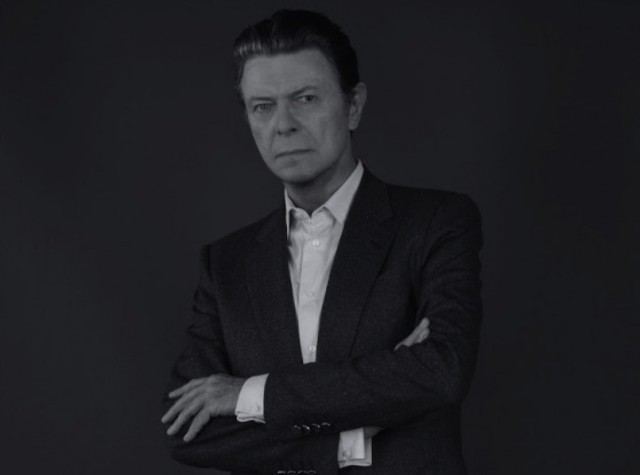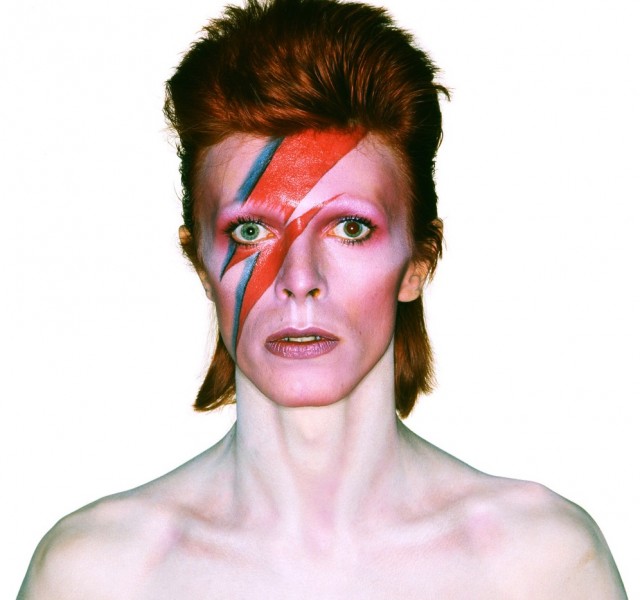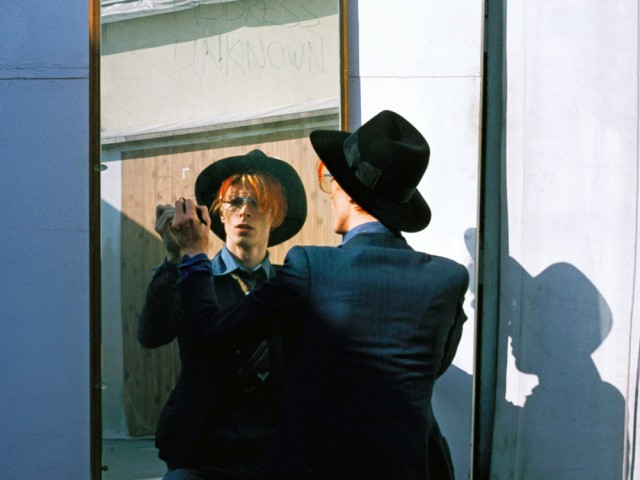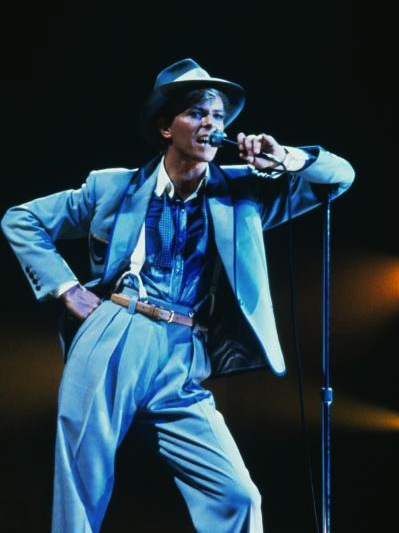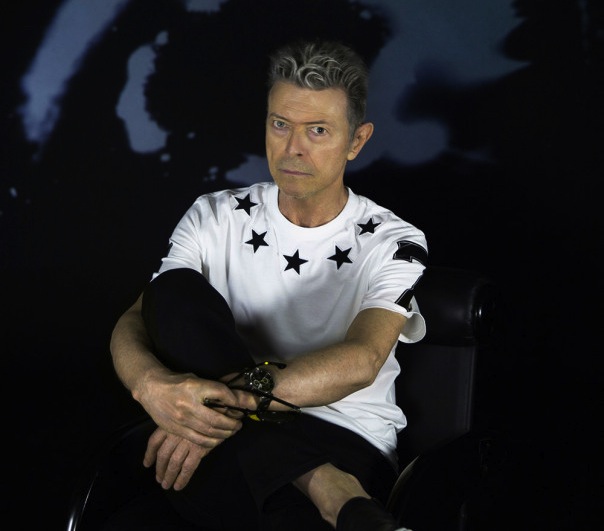David Bowie was a master of storytelling, of theatricality, of stagecraft, of audience misdirection. He may have been a musician first and foremost, but he was constantly playing with imagery and appearance, presenting himself and his work in new and different ways. He could walk onstage with an acoustic guitar and command the attention of everyone in the room, or he could fashion elaborate spectacles with hundreds of moving parts. He knew the key to magic was in letting everyone see just enough, and no more. He understood the spotlight, and he knew when standing in darkness would create a more powerful effect. And right up to the end, he continued to blur the lines between his art and his showmanship. He effectively dropped out of sight for ten years after a health scare in 2004, surfacing only to lend backing vocals to records by artists whose work he appreciated. He returned to the public eye over the past three years, seemingly revitalized. He released The Next Day in 2013, a new album that both revisited and re-imagined elements of his past, and pushed off in new and exciting directions. He released a definitive career-spanning ‘Best Of’ collection. He assembled a retrospective exhibit that is touring around the world. And in November, he launched Lazarus, an Off-Broadway musical.
Over the last two weeks, we didn’t realize we were witnessing his final act, but the moment we discovered the curtain had fallen, it became clear. Whether or not he intended it, he delivered a closing trick that left us all standing and applauding, a spectacular finale that masked the star’s ultimate exit, one last marvelous bit of sleight-of-hand. He celebrated his birthday by releasing a universally-acclaimed new album, and disappeared while everyone was listening.
* * * * *
David Bowie is many things to many people. Which is partly because he himself became so many people over the course of his life.
It might have been borne of inspiration, it might have been a desire to entertain and be noticed, it may have been that he was easily bored and couldn’t stay infatuated with a single way of being for too long, but David Bowie’s true innovation was in his refusal to stand still, his constantly shifting look and sound and way of being. He’s often referred to as a chameleon, but that’s not quite accurate – chameleons change to blend in with the background, to hide, to protect themselves. David Bowie always stood apart from his environment.
Which is not to say he wasn’t aware of his surroundings. He was constantly, famously, endlessly keeping tabs on pop culture. He absorbed everything, and when he saw things he liked, he refashioned them in his own image, mixing them in with whatever else struck his fancy. He synthesized ideas, blended them, made them better. Long before Hip-Hop made sampling a fixture of recontextulizing and recombining elements, Bowie was doing it in every element of his public persona. He took the best parts of Scott Walker, Marc Bolan, George Orwell, Lou Reed, Anthony Newley, and Edith Piaf, and invented an identity that could encompass them all. And then, by the time the world caught up, he’d run off to take on something else entirely. Bolan kept on boogieing in platform boots, but Bowie had already put on a tie and set his sights on Soul Train. Popular R&B went full-tilt disco, while Bowie decamped to Berlin with Brian Eno and a head full of synthesizer sounds. The ‘New Romantic’ generation of the early ’80s built an entire culture around the androgynous dandyism that Bowie had once defined, and their mentor was holed up in the studio with discopop maestro Nile Rogers.
It’s also notable that, unlike many, Bowie never hid the fact he incorporated others’ ideas in his own work – in fact, he let everyone know about it. If he liked an artist, he’d talk about them, cover their song, take them on tour, collaborate with them, or show up to sing backing vocals on their record.
That knack for staying interested kept him interesting, and his skill as an entertainer ensured that he stayed visible through change after change after change, through each new look and new style. He wove together his personal interests with an awareness that made even his most experimental moments palatable to the causal listener. His career path is full of sharp left turns that only made sense in retrospect, once we (as his audience) could place them in the proper perspective. The Goblin King. The Thin White Duke. The Dapper Elder Statesman. The Drum ‘N’ Bass Union Jack Puppetmaster. The World-Beating Popstar. The Man Who Fell To Earth. Lady Stardust.
He didn’t always manage to balance creative and commercial concerns, and often contradicted himself as he went, accepting that contradictions are okay. He curated his own history with the understanding that ideas are both ephemeral and immortal, leaving behind each skin as he moved on to a new one while carefully preserving the bits he liked. And what makes his final four albums so rewarding is how they convey the sound of a restless artist coming to terms with his own legacy, and embracing the past even as he continued to push himself forward. The man who famously vowed (on numerous occasions) that he was “playing the hits for the last time” finally did with himself what he’d done so many times over his career, and found a way to reconcile the past and present, becoming even more legendary in the process.
And ever striving for new ideas, with Blackstar (and the accompanying videos) he delivered a statement that faced the unknown with grace, style, and one last blast of prescient curiosity. The album appeared on Friday, and on Sunday, right as the swell of appreciation was reaching a peak, he walked offstage for the last time. We went to bed on Sunday considering his stunning rebirth, and on Monday morning we were realizing he was gone.
It was a fitting final move from a man who was constantly in motion, throughout his long career. It was perfectly dramatic, perfectly theatrical. His music has always evoked deep emotion through carefully crafted motions, the effect amplified by the remove between audience and performer. Is ‘Heroes’ a song of triumph or tragedy? Or is it both at once? The single edit can be read as a celebratory singalong, while the album version openly faces the cruelty of relationships, while dreaming of transcendence. There’s enough uncertainty that we hear it however we want. We can all hear in Bowie’s music what we need to, but we keep finding more as we dive deeper. We sing along to the songs, but we’ll never be certain of all their mysteries. We listen and can only guess at his intentions – the part we’re certain of is how it makes us feel. Those feelings will change over time, and we’ll keep listening and discovering.
Blackstar sounded like a rebirth on the day it was released, like a last will and testament two days later, and like a triumphant valediction as we try to reconcile those two impulses into a single story. A rocket into the heavens, a quiet dissolve into the ether. The death and the resurrection, finality and immortality, one last thrilling contradiction. We celebrate the idea of David Bowie, and the man slips away, undetected. We’ve witnessed one last amazing illusion, and that’s the image that we’re left with.
Was this planned? Was this all how he intended it? We’ll never really know. He kept blurring the lines of artifice and artistry, right up to to the last possible moment.
* * * * *
It was the first time I’d ever been to New York on my own. I was…seventeen or eighteen? I don’t know, it was a long time ago. We’ll say seventeen.
Someone gave me a ride to NYC and I was going to stay with a friend. She wasn’t a really close friend, or even someone I’d ever spent much time with, but we moved in the same circles. She was housesitting for the summer – an artist’s loft with a couch I could sleep on, the entire fourth floor of a building on the Bowery, a space that used to be a machine shop, next to a lot filled with barbed wire and junked cars.
I got in late. We met somewhere and walked over to her place, grabbing some food along the way and dodging a drunken fight that spilled out of a building and onto the sidewalk. We stayed up late, drinking red wine and talking, interrupted only by the barking of dogs in the yard next door and the endless sirens passing by.
In the morning, I woke up to music. She was sitting cross-legged on the floor, next to a turntable playing an old beat-up copy of Ziggy Stardust. The sun was streaming into the room, and her long red hair was ablaze in the daylight. ‘Five Years’ was rising out of the pops and clicks of the vinyl, slowly building in intensity. Boom boom, boom BOOM. The news had just come over. I don’t think you knew you were in this song. Five years, stuck on my eyes. Five years, what a surprise.
And the world was going to end. And the world was full of possibility.

